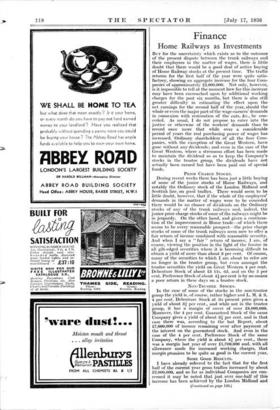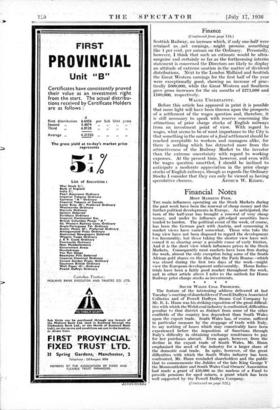Home Railways as Investments
Finance
RUT for the uncertainty which exists as to the outcome of the present dispute between the trunk railways and their employees in the matter of wages, there is little doubt that there would be a good deal of active buying of Home Railway stocks at the present time. The traffic returns for the first half of the year were quite satis- factory, showing an aggregate increase for the four Com- panies of approximately £2,000,000. Not only, however, is it impossible to tell at the moment how far this increase may have been encroached upon by additional working charges for the past six months, but there is also still greater difficulty in estimating the effect upon the net earnings for the second half of the year, should the whole or even the major part of the wage-earners' demands in connexion with restoration of the cuts, &c., be con- ceded. As usual, I do not propose to enter into the justice or otherwise of the workers' demands than to record once more that while over a considerable period of years the real purchasing power of wages has increased, Ordinary shareholders of all the four Com- panies, with the exception of the Great Western, have gone without any dividends; and even in the case of the Great Western, where a strenuous effort has been made to maintain the dividend so as to keep the Company's stocks in the trustee group, the dividends have not actually been earned but have been paid out of special funds.
PRIOR CHARGE STOCKS.
During recent weeks there has been just a little buying of some of the junior stocks of Home Railways, and notably the Ordinary stock of the London Midland and Scottish line, on good traffics. There would seem to be little doubt, however, that if the whole of the employees' demands in the matter of wages were to be conceded there would be no chance of dividends on the Ordinary stocks of any of the trunk railways and, indeed, the junior prior charge stocks of some of the railways might be in jeopardy. On the other hand, and given a continua- tion of the improvement in Home trade—of which there seems to be every reasonable prospect—the prior charge stocks of some of the trunk railways seem now to offer a fair return of income combined with reasonable security. And when I say a " fair " return of income, I am, of course, viewing the position in the light of the famine in all gilt-edged securities where it is becoming difficult to obtain a yield of more than about 3 per cent. Of course, many of the securities to which I am about to refer are no longer in the trustee group, but even amongst the trustee securities the yield on Great Western 4 per cent. Debenture Stock of about £3 lls. 6d. and on the 5 per cent. Preference Stock of about 44 per cent is by no means a poor return in these days on a trustee stock.
NON-TRUSTEE STOCKS.
In the case of some of the stocks in the non-trustee group the yield is, of course, rather higher and L. M. & S. 4 per cent. Debenture Stock at its present price gives a yield of about 3f per cent., and while not in the trustee group, it has a margin of cover of over Z8,000,000. Moreover, the 4 per cent. Guaranteed Stock of the same Company gives a yield of about 31 per cent, and in that case there was, according to the last Report, about £7,000,000 of income remaining over after payment of the interest on the guaranteed stock. And even in the case of the 4 per cent. Preference Stock of the same Company, where the yield is about 41 per cent., there was a margin last year of over £1,700,000 and, with all allowance made for increased working charges, that margin promises to be quite as good in the current year.
Sow GOOD RESULTS.
I have already referred to the fact that for the first half of the current year gross traffics increased by about £2,000,000, and so far as. individual Companies are con- cerned it may be noted that just over one-half of this increase has been achieved by the London Midland and (Continued on page 120.)
Finance
(Continued from page.118.) Scottish Railway, an increase which, if only one-half were retained _ as; pet earnings, , might, -promise, something like 1 per cent. per annum on the Ordinary. Personally, however, I think that such -an estimate would be ultra- sanguine and certainly so far, as -the- forthcoming interim statement is concerned the Directors are likely to display an attitude of extreme caution in the matter of dividend distributions. -Nat to the 'London: mialiind and Scottish the Great Western earnings for the first half of the year were exceptionally good, showing an increase of . prac- tically £600,000, while the Great Western and Southern gave gross increases for the six months of £275,000 and £109,000, respectively. ••
WAGES UNCERTAINTY.
Before this article has appeared hi print it is possible that more light will have been thrown upon the prospects of a settlement of the wages question and, therefore, it is still necessary to speak with reserve concerning the attractions of prior charge stocks of English railways from an investment point of view. With regard to wages, what seems'to be of most importance to the City is that something in the nature of a final settlement should be reached acceptable to workers and managers alike, for there is nothing which has detracted more from the attractiveness of the Railway Market to the investor than the extreme uncertainty with regard to working expenses. At the present time, however, and even with the wages question unsettled, I should be inclined to anticipate a moderate appreciation in the prior charge stocks of English railways, though as regards the Ordinary Stocks I consider that they can only be viewed as having















































 Previous page
Previous page